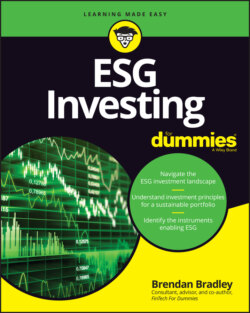Читать книгу ESG Investing For Dummies - Brendan Bradley - Страница 24
Using International Standards to Determine ESG Objectives
ОглавлениеThe global regulatory ecosystem is moving fast, with many countries upholding ESG requirements in regulations. A recent study suggests that in the last decade, governments have enacted over 500 new measures globally to advocate ESG issues. Numerous market participants feel that regulatory developments are a key driver in the uptake of ESG investing. While many voluntary disclosure bodies have contributed to an increase in the availability of ESG data by pushing for greater disclosure and creating frameworks and standards, and therefore the success of the ESG explosion in recent years, the sense is that we’re at the point where we need further mandatory disclosure requirements.
However, a group of five sustainability standard-setters has declared their own intent to collaborate better, appearing to accept the complaints of “reporting overload” with the “competing initiatives” concerns. It was felt that the plethora of entities was holding up progress and encouraging jurisdictional fragmentation. However, this statement of intent comes at a time when the European Union (EU) has set in motion a large-scale legislative program to make ESG concerns a central piece of regulation in the financial services industry, which will further increase disclosure requirements. Ultimately, the market should put a common, standardized disclosure mechanism in place, whereby material reporting will be unearthed that provides more informed input to the ESG rating models, which should lead to greater consistency on ESG scores.
Although companies report a lot more sustainability information than in the past, much of the disclosure is aimed at a broader set of stakeholders, which limits its usefulness to investors. They are more interested in a subset of sustainability issues representing key business drivers for value creation, such as the industry-specific factors identified by the Sustainability Accounting Standards Board (SASB). Corporate sustainability reporting has generally lacked an investor focus, encouraging companies to primarily report information on broader ESG factors, which affects the ratings that data providers have been able to produce. The majority of ESG risks that investors want to see are more industry-specific factors.
The following sections emphasize the increasing shift to regulatory oversight on sustainability as well as the roles played and foresight shown by the United Nations and the disclosure reporting standard-setters in building the agenda that has contributed to the success of ESG.
